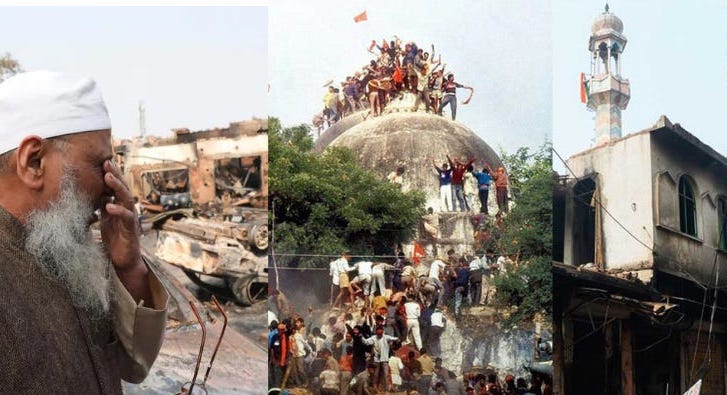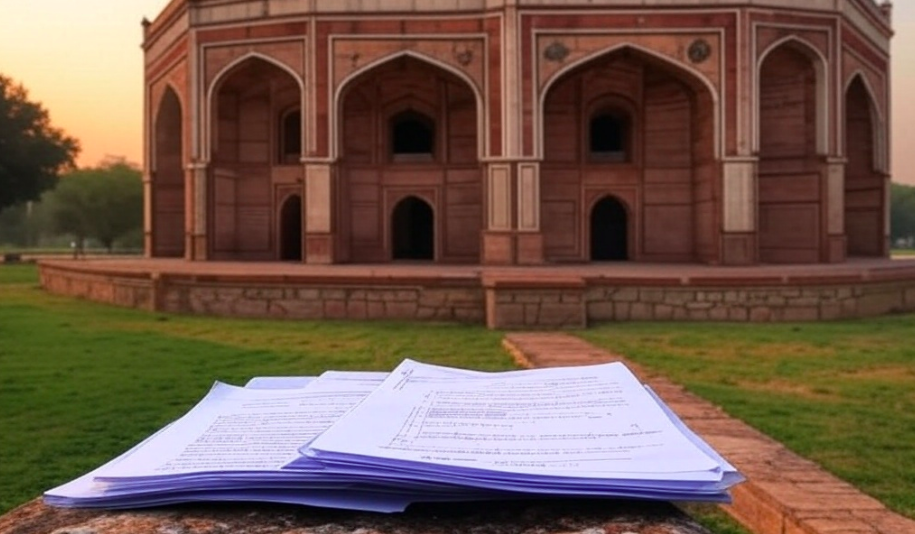A place where we feel close to God, be it a temple, church, gurudwara, or mosque, is what we call a place of worship. These places, despite their different names and practices, share the same purpose: to connect with the divine. Maulana Abul Kalam Azad, an Indian freedom fighter and scholar, emphasized the importance of protecting religious sites and harmony. “Every mosque and temple in the country is my pride; every Christian and Muslim in India is my brother.”
With its diverse heritage and culture, India is known for embracing all religions and keeping them together peacefully. This inclusivity forms the very essence of India’s identity. The very foundation of the nation, established in 1947, was etched with the principles of secularism, developing unity amidst diversity. However, in recent years, there’s been a troubling trend of vandalizing mosques across many states. Whether during riots or other religious festivals, Muslims and their places of worship seem to be targeted and tormented. Conversations with individuals from the Muslim community shed light on the pervasive fear and sense of insecurity they experience. It’s disheartening when a citizen, regardless of faith, expresses fear within their homeland. As a nation, we are witnessing political divisions that are deeply troubling.
Recent events underscore a distressing trend of religious tension and violence across various regions of India. The 2019 Supreme Court ruling, which involved the Babri Masjid in Ayodhya, has further fueled contentious disputes. Tragic incidents, such as the burning of fourteen Delhi mosques and a dargah by Hindutva vigilantes in March 2020 and the targeting of sixteen mosques during a VHP rally in October 2021, depict a disturbing pattern of communal unrest.
The situation escalated in April 2022 when riots erupted in Rajasthan’s Karauli district following a bike rally tied to the Hindu New Year, leading to reported incidents of stone-pelting. Subsequent events in August 2023 witnessed the brutal killing of Muslims and the arson of mosques during yet another rally by violent mobs. At the heart of this volatile narrative are allegations, sometimes based on false claims, surrounding the alleged destruction of Hindu temples to erect mosques.
Instances like the controversy surrounding the Shamsi Jama Masjid in Uttar Pradesh, the intrusion of a Hindu crowd into a madrassa in Karnataka to place a Hindu idol and perform prayers, and the dispute over the 17th-century Gyanvapi mosque in Varanasi, constructed by Aurangzeb, have added fuel to these conflicts. Unfortunately, these incidents form only a fraction of a much longer list, with similar disputes occurring across the country, numbering in the thousands.
Such incidents underscore a disturbing lack of acceptance toward the Muslim populace, their customs, and their way of life. It is not only a social disturbance but also economic inequality. Loads of research, from looking at different countries to doing experiments in labs, all point to one thing: trust is super important for making economies grow. When a society breaks apart and hate spreads, it puts the brakes on how much the economy can expand. That’s why, when people wonder if getting along with different religions helps the economy, the answer is a big, resounding yes. Economists have a lot to say about this too. Joseph Stiglitz, a Nobel Prize-winning economist, highlighted, “Strong social cohesion contributes to economic development.” These words underline how trust and togetherness are like fuel for a country’s economic engine.
There is an urgent need for a positive transformation to bind the country with the same values of secularism, love, and togetherness. The media has a responsibility to present unbiased and accurate information. However, despite how far hate has spread, it’s never too late to change. The press is not only free but also powerful. That power is like fire; it can be dangerous, but it can also be immensely beneficial. Let us not allow the country to be divided, as invaders did in their pursuit of power. India belongs to every religion, and this inclusivity sets it apart in the world. As Mahatma Gandhi once said, “Our ability to reach unity in diversity will be the beauty and the test of our civilization.” Let us heed these words and work towards unity, respecting every faith, and preserving the sanctity of all places of worship. It’s time to embrace the true spirit of India, a land where harmony, acceptance, and love triumph over division.









